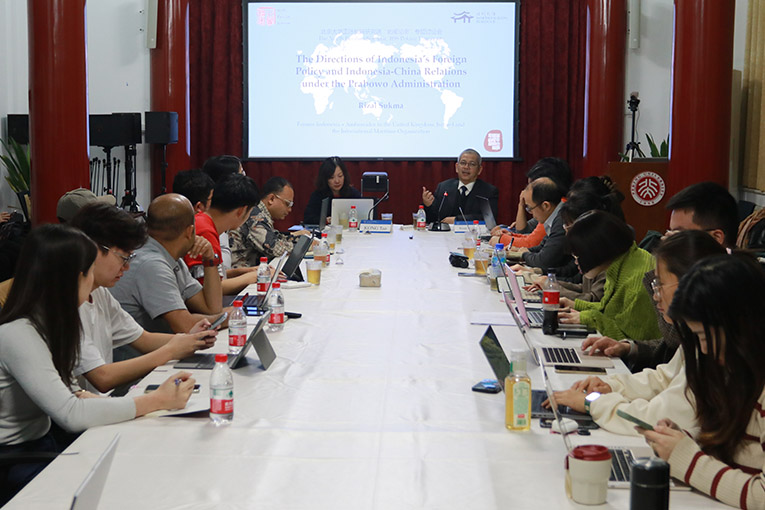On the afternoon of November 13, 2024, Dr. Rizal Sukma, Senior Fellow at the Jakarta Centre for Strategic and International Studies, delivered a lecture at the North Pavilion of Peking University (PKU) as an invited participant in the 10th North Pavilion Dialogue. The lecture was titled "The Directions of Indonesia's Foreign Policy and Indonesia-China Relations Under the Prabowo Administration". The event was hosted by Kong Tao, Director and Associate Research Fellow of the Research Department of the Institute of Social Science Survey, PKU, and Senior Research Fellow at the Institute of Digital Finance, PKU. Faculty and students from PKU, Tsinghua University, and China Foreign Affairs University attended the lecture.

Dr. Rizal Sukma elaborated on four principles that will guide Indonesia's foreign policy: First, Indonesia will continue to pursue a "free and active" foreign policy, avoiding alliances and acting based on its national interests. Second, Indonesia emphasizes understanding the world from a historical perspective and has a historical tradition of opposing colonialism and imperialism. In the face of the current world order, Indonesia opposes the dominance of international affairs by a few powerful countries or organizations. Third, Indonesia prioritizes the role of regional frameworks and will advocate for ASEAN reforms to enhance its problem-solving capabilities and promote its effective functioning. Fourth, Indonesia values multilateral mechanisms and will focus on the development of multilateral platforms such as ASEAN, the Asia-Pacific Economic Cooperation (APEC), and the Regional Comprehensive Economic Partnership (RCEP).
Regarding the foreign policy and key agendas of the Prabowo administration, Dr. Sukma noted that the newly elected president tends to adopt a more proactive approach in formulating and implementing foreign policy, enabling Indonesia to play a greater role in geopolitical issues both regionally and globally. At the same time, Indonesia's foreign policy is also influenced by economic interests. Indonesia will continue to focus on key economic agendas such as human capital and infrastructure, placing importance on cooperation with China and other Asian countries to attract more foreign investment. Regarding Indonesia-China relations, Dr. Sukma stated that the two countries have a long history of interaction, and their level of cooperation has been continuously increasing. Indonesia needs more experts in Chinese studies to understand Chinese culture and contemporary China and to strengthen bilateral relations. Both countries can work more actively to address regional issues and establish and improve relevant mechanisms.
During the Q&A session, Dr. Sukma engaged in lively discussions with faculty and students attending the lecture on a range of topics, such as great power competition and Indonesia-China relations, Chinese investment in Indonesia, the South China Sea issue, ASEAN's role and challenges in regional affairs, and the continuity of Indonesia's foreign policy.(Contributed by Zhao Shuyun)
Editor: Li Fangqi | Photographer: Zheng Peijie

